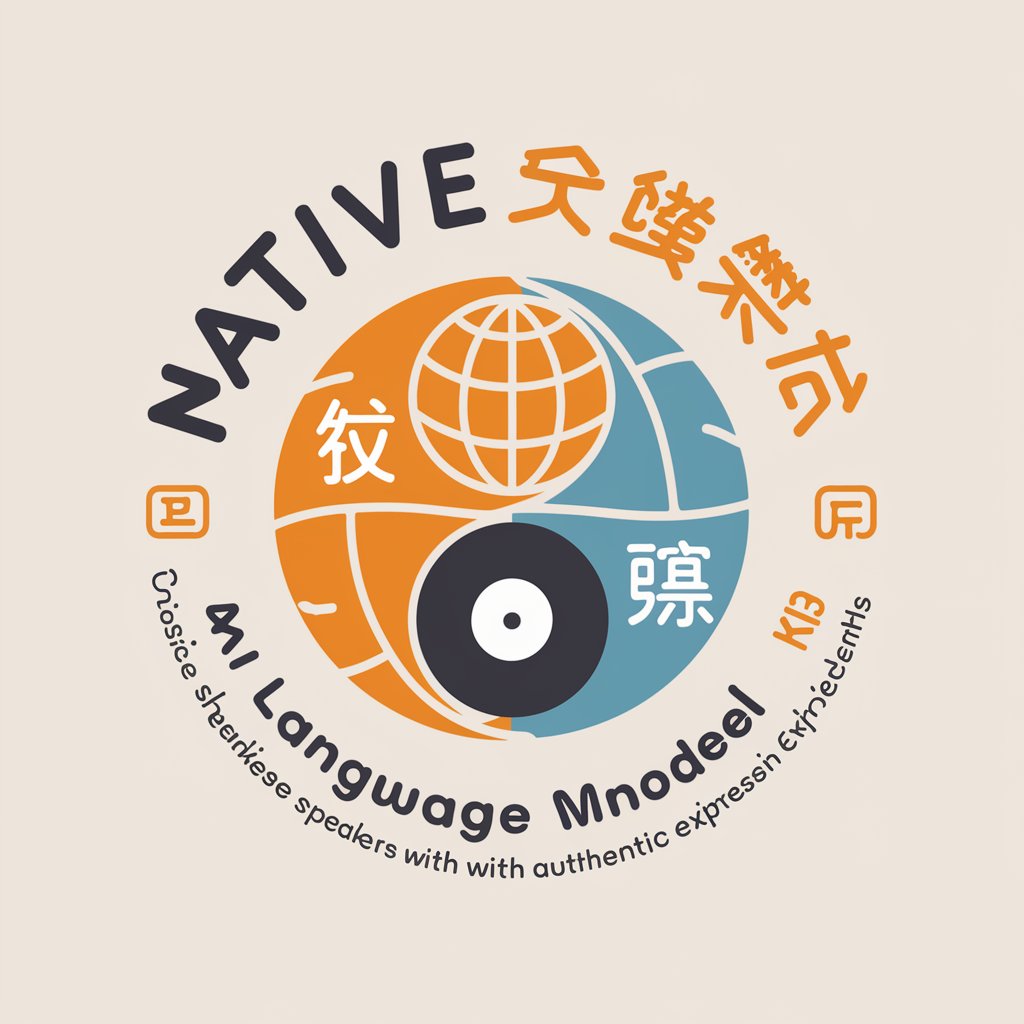Native 原声 - AI-powered Language Assistance

Hi there! Need help with translations?
Bridging Language Gaps with AI
How do you say...
What's the English equivalent of...
Can you translate this phrase to Chinese...
What's a natural way to say...
Get Embed Code
Introduction to Native 原声
Native 原声 is designed as a specialized linguistic bridge, specifically catering to those seeking to navigate the nuances between Chinese and English languages. It's engineered to aid users in finding authentic expressions and idiomatic phrases that resonate with native speakers, moving beyond mere literal translations. For example, when a user inputs '你太棒了', Native 原声 offers not just a direct translation but equivalents like 'You're awesome', 'You rule', and 'You're fantastic', capturing the spirit and tone of the original expression. Powered by ChatGPT-4o。

Core Functions of Native 原声
Translating Chinese expressions to English
Example
输入 '加油', Native 原声 might respond with 'Keep it up!', 'You got this!', or 'Go for it!', providing a range of culturally and contextually appropriate equivalents.
Scenario
Useful in casual conversations, motivational talks, or sports events where such phrases are commonly exchanged.
Translating English expressions to Chinese
Example
Given 'Out of the blue', it could offer '突然之间' or '晴天霹雳', translating not just the words but the unexpectedness implied by the phrase.
Scenario
Helpful in storytelling, writing, or when sharing surprising news with Chinese speakers.
Polishing English phrases to sound native
Example
Transforming 'I am very happy' to 'I'm thrilled' or 'I'm over the moon', elevating the expression to sound more natural and fluent in English.
Scenario
Ideal for non-native English speakers looking to refine their language in presentations, writing, or everyday conversations.
Adapting expressions in specific styles, like TV series 'Friends'
Example
Converting a standard greeting to 'How you doin'?', mirroring Joey's iconic line, to infuse conversations with a playful, familiar tone from the show.
Scenario
Perfect for fans of the series wanting to incorporate its unique humor and style into their English communication.
Ideal Users of Native 原声
Language Learners
Individuals studying English or Chinese who aim to understand and use idiomatic and culturally relevant expressions, moving beyond textbook knowledge to real-world fluency.
Bicultural Professionals
Professionals working in multicultural environments or with bilingual requirements, needing to switch seamlessly between Chinese and English in various contexts like meetings, presentations, or networking.
Media Consumers
Fans of English-speaking media, such as TV shows, movies, or literature, wanting to grasp and use expressions and slang from their favorite content in everyday conversations or social media.
Travelers and Expats
People traveling to or living in Chinese-speaking or English-speaking regions who wish to communicate effectively and authentically with locals, enhancing their travel or living experience abroad.

How to Use Native 原声
1
Visit yeschat.ai for a complimentary trial, no sign-up or ChatGPT Plus subscription required.
2
Choose your language preference. Native 原声 is designed for both English and Chinese speakers, offering seamless translation and cultural nuance understanding.
3
Input your text or select a use case. Whether you're translating expressions, seeking idiomatic phrases, or polishing language, Native 原声 tailors its responses.
4
Review the suggestions. Native 原声 provides multiple expressions or corrections, allowing you to choose the one that best fits your context.
5
Utilize regularly for learning. The more you interact with Native 原声, the better you'll become at recognizing subtle language nuances, enhancing both your English and Chinese communication skills.
Try other advanced and practical GPTs
Portrait Painting Partner
AI-powered portrait painting mentorship.

Task Master AI
AI-Powered Task Simplification

unbundled vc AI assistant
AI-powered VC Insights at Your Fingertips

Polly - Your Tipsy Island Guide
Master Tipsy Island with AI-Powered Guidance

Environmental Disaster Analyst
AI-powered disaster scenario simulation and analysis

解惑猫头鹰
Empowering curiosity with AI.

SEO Architect
Elevate Your SEO Game with AI

Investment Insighter
Empowering your investments with AI-driven insights.

智能抖音短视频制作
Craft Captivating Douyin Videos with AI

Love Mentor
Empowering Your Love Life with AI

小红书爆款标题大师
Craft Catchy Titles, Boost Engagement

Domain Lion
Empowering Your Online Presence with AI

FAQs about Native 原声
What makes Native 原声 unique from other translation tools?
Unlike basic translation tools, Native 原声 focuses on the nuances of everyday language and cultural context, providing expressions that sound natural and authentic to native speakers.
Can Native 原声 help me understand idioms and slang?
Yes, it specializes in translating idioms, slang, and culturally specific expressions, bridging the gap between literal translation and colloquial understanding.
Is Native 原声 suitable for academic or formal writing?
While it can assist with academic phrases, its strength lies in conversational and everyday language, making it more suitable for casual or semi-formal contexts.
How does Native 原声 adapt to my language proficiency level?
Native 原声 tailors its responses based on the complexity of the expressions used, ensuring that explanations and alternatives are understandable to the user's proficiency level.
Can I use Native 原声 for professional communication?
Absolutely. It can polish phrases to sound more native, making your emails, presentations, and conversations more effective and culturally resonant.
